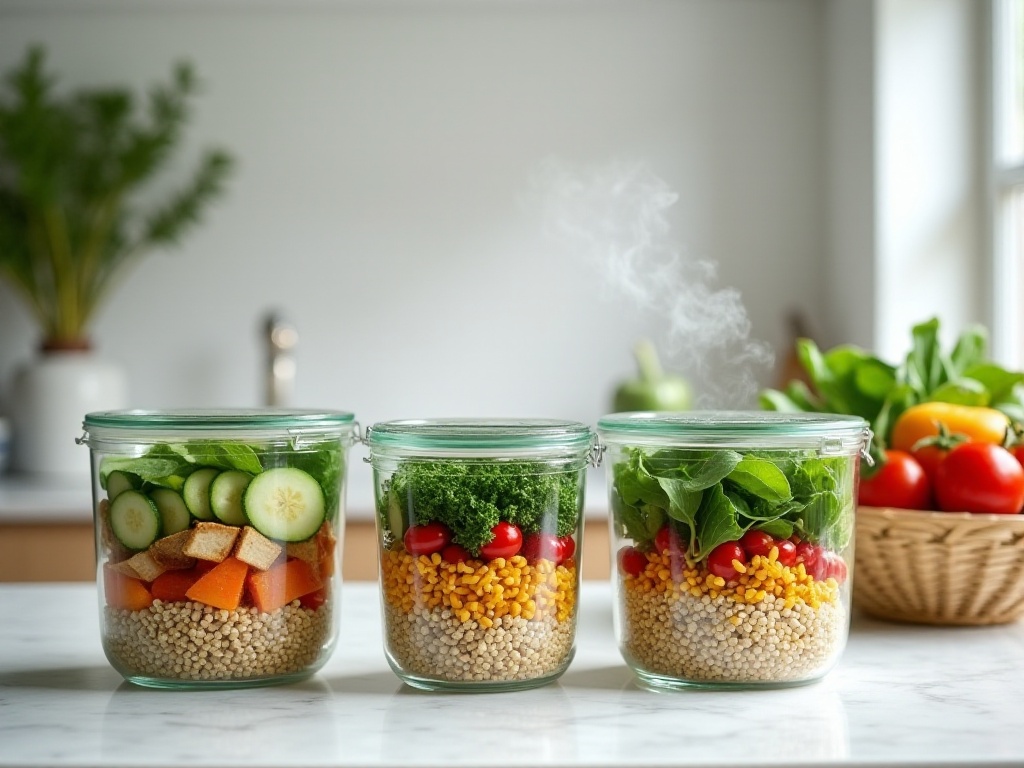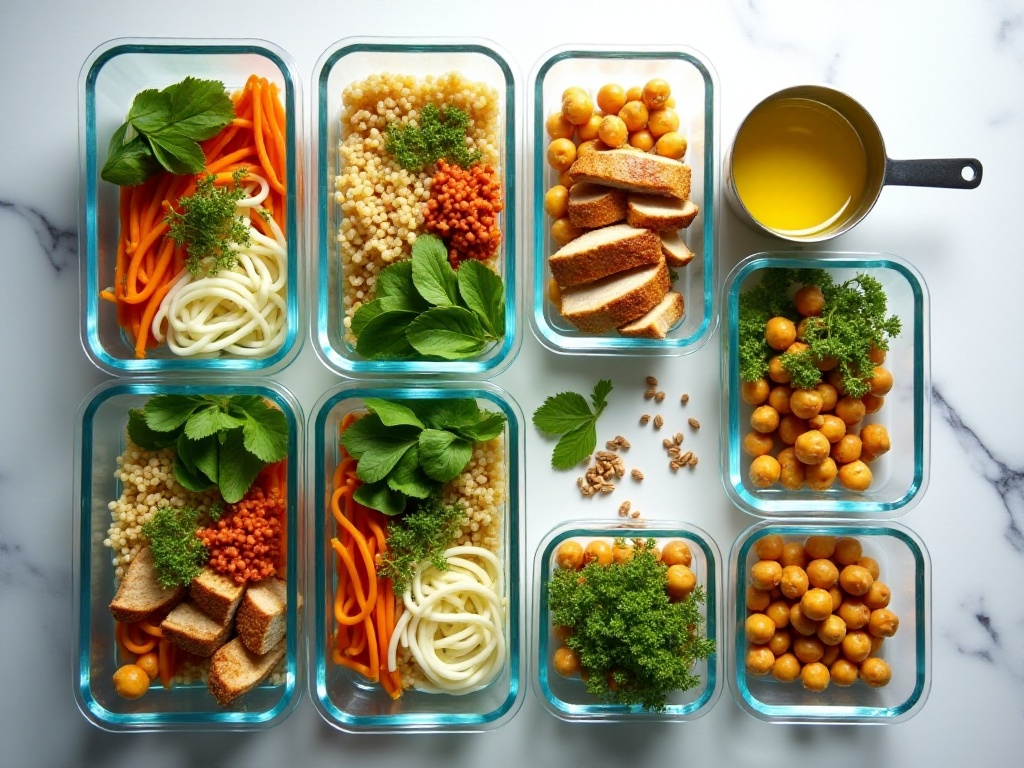Opening Remarks
I've been researching nutrition lately, using myself as a "dietary laboratory." I've been incredibly invested, experimenting daily with different food combinations and cooking methods. Through this exploration, I've discovered that healthy eating is actually quite simple - it's all about finding the right approach.
When I first started, I was overwhelmed by various "dietary advice" - ketogenic diet, intermittent fasting, and so on. Eventually, I decided to set aside these fancy concepts and start with basic nutrition knowledge, gradually developing a method that works for me.
Dietary Principles
When it comes to healthy eating, many people immediately think of "bland" or "tasteless," assuming healthy eating means only boiled vegetables and plain boiled chicken breast. As a major foodie, I must say this is completely wrong! The core of healthy eating is nutritional balance, and it's essential to enjoy your food.
Once, my mom saw me busy in the kitchen and thought I was on a diet. Actually, I was researching how to make healthy ingredients delicious. For instance, I discovered that when pan-frying salmon in olive oil, searing the skin until golden and crispy not only tastes better but also retains more nutrients.
Fiber is Key
When people think of fiber, many imagine tough whole grains, but fiber sources can be delicious. I recently became obsessed with a super tasty breakfast recipe: ground oatmeal mixed with banana, blueberries, and honey to make a breakfast porridge. It's not only smooth in texture but also easy to digest. Sometimes I add chia seeds and dragon fruit for both aesthetics and nutrition!
I read a nutrition study that said consuming 25-35 grams of dietary fiber daily can help prevent many chronic diseases. Increasing fiber intake is particularly helpful for weight control because fiber helps us feel fuller. I started from 15 grams of fiber daily and gradually increased to about 30 grams now, and I definitely feel much lighter.
Besides breakfast, I particularly enjoy adding various vegetables to lunch and dinner. For example, I'll cut broccoli, carrots, and zucchini into small pieces, lightly stir-fry them in olive oil, and season with a bit of sea salt and black pepper - simple yet delicious. Sometimes I make a vegetable salad with homemade yogurt dressing, which is not only nutritious but also appetizing.

Protein is Important
Speaking of protein, it's absolutely crucial in a healthy diet. I used to snack uncontrollably because of insufficient protein intake. Later, I learned that according to the latest nutrition guidelines, 10-35% of our daily calories should come from protein.
For example, if you consume 2000 calories daily, your protein intake should be between 50-175 grams. Sounds professional, right? But it's actually easy to achieve. For instance, a boiled egg contains 6 grams of protein, a piece of chicken breast (about 100g) contains 31 grams of protein, and a cup of yogurt contains 8 grams of protein.
Now I ensure I get enough quality protein daily. Breakfast might be two boiled eggs with oatmeal, lunch could be chicken breast with brown rice and vegetables, and dinner might be salmon with quinoa. Sounds abundant, right? This combination satisfies protein needs without being monotonous.
Practical Guide
Smart Shopping
When it comes to shopping, I have plenty to say! I used to be an impulse buyer at supermarkets, often buying things I didn't need. Later, I discovered a really effective method: always bring a shopping list to the supermarket.
Research shows that people with shopping lists are more likely to stick to healthy eating and can save about 15-20% on shopping expenses. Now I plan my weekly menu every Sunday night and make a shopping list based on it. This helps avoid buying too much or too little while ensuring nutritional balance.
My shopping list typically includes: Fresh protein sources (chicken breast, salmon, shrimp, etc.) Whole grains (oats, brown rice, quinoa, etc.) Vegetables of various colors (broccoli, spinach, carrots, etc.) Seasonal fruits (apples, oranges, dragon fruit, etc.) Healthy fat sources (avocados, nuts, olive oil, etc.)
I've also found that supermarkets are very crowded on weekends, so I usually go after work on weekdays. Not only are there fewer people, but some items are also on sale - it's a great way to save money and stress.
Meal Prep
Meal prep is my specialty! When I first started preparing healthy meals, it seemed really troublesome. Having to think about what to eat every day, then buy and cook immediately not only wastes time but also makes it easy to order takeout when feeling lazy.
Later I discovered a super practical method: spending two hours on Sunday to prep meals for the week. Now every Sunday afternoon I become a "chef," preparing lunches and some dinners for the whole week.
My "Sunday Kitchen Day" goes like this: First, I prepare 5-6 sealed containers, then cook multiple items simultaneously. For example, steaming chicken breast while cooking brown rice in the rice cooker and roasting seasonal vegetables in the oven. This multi-tasking not only saves time but also ensures balanced nutrition in each meal.
Specifically, I arrange it like this: Step 1: Slice chicken breast, marinate with salt, pepper, and rosemary Step 2: Put brown rice and quinoa in the rice cooker Step 3: Cut vegetables into chunks, drizzle with olive oil and herbs, put in the oven Step 4: Once everything is ready, portion into sealed containers
This meal prep method saves at least 6-8 hours of cooking time per week. Most importantly, having healthy meals ready prevents resorting to junk food when feeling lazy to cook.
Common Misconceptions

Less is Better?
I need to loudly say NO to this misconception! I made this mistake before, thinking eating less meant being healthy, but I ended up not only not losing weight but also feeling constantly tired.
According to nutrition research, strictly limiting calories actually leads to slower metabolism, ultimately counterproductive. My current approach is maintaining normal food intake while paying attention to food quality and nutritional value. For example, instead of eating a bag of chips, I'll have an apple with a small handful of almonds, satisfying cravings without consuming empty calories.
I've also noticed an interesting phenomenon: when I started focusing on nutritional balance instead of deliberately restricting food, weight control became easier. This might be because balanced nutrition improves metabolism, and there's no rebound from excessive restriction.
Are Snacks Junk Food?
This view is also completely wrong! Appropriate snacking can help control appetite and supplement energy and nutrition. The key is choosing the right snacks.
One of my recent favorite healthy snacks is roasted almond slices, which contain only 160 calories per small handful but provide 6 grams of protein and 3.5 grams of dietary fiber. Plus, almonds are rich in vitamin E and healthy fats, which are great for skin and cardiovascular health.
Besides almonds, I prepare other healthy snacks: Fruit slices with yogurt Homemade energy balls (made with dates and nuts) Roasted chickpeas Sugar-free dried fruits Whole wheat crackers with peanut butter
These snacks are not only delicious but also highly nutritious. I've found that having these healthy snack options prevents me from buying high-sugar, high-fat snacks.
Practical Suggestions

Gradual Progress
Changing dietary habits isn't something that happens overnight. According to behavioral psychology research, it takes an average of 66 days to form a new habit. So don't rush - taking it slow makes it easier to maintain.
I started with small changes myself. For example, the first week I just switched from bread to oatmeal for breakfast, the second week I started adding more vegetables to lunch, and the third week I began cooking dinner myself. Taking it step by step makes it less overwhelming and easier to stick to.
Looking back now, those changes have become natural habits. For instance, I'm no longer interested in junk food and prefer my own healthy cooking.
Recording is Important
Recording is really a useful method! I use my phone to record daily food intake, which helps me clearly know what I'm consuming and adjust my diet structure accordingly.
Research shows that people who record their diet are about 40% more likely to achieve their healthy eating goals than those who don't. I think this might be because recording makes us more conscious about food choices rather than eating whatever we want.
My recording method is simple: Breakfast: Record portions of main food, protein, and fruit Lunch and Dinner: Record ratios of main food, protein, and vegetables Snacks: Record types and approximate portions Water intake: Record daily water consumption
This recording makes it easy to notice dietary patterns, like when I'm most likely to snack or which days I eat fewer vegetables.
Final Thoughts
Through this period of practice, I increasingly feel that healthy eating is a gradual cultivation process, and the important thing is finding what works for you. Sometimes you might indulge a bit, but as long as the general direction is right, there's no need to be too hard on yourself.
As I often say: Rather than pursuing a perfect diet plan, it's better to find one you can stick to. The best plan is the one you can maintain. Healthy eating isn't a short-term race but a lifelong habit.
Now I can naturally choose healthy foods and don't feel guilty about having an occasional feast. This balanced mindset might be the most important part of healthy eating.
Have you tried any of these methods? Or do you have other healthy eating insights to share? Welcome to share your thoughts and experiences in the comments. Your experience might help others!







